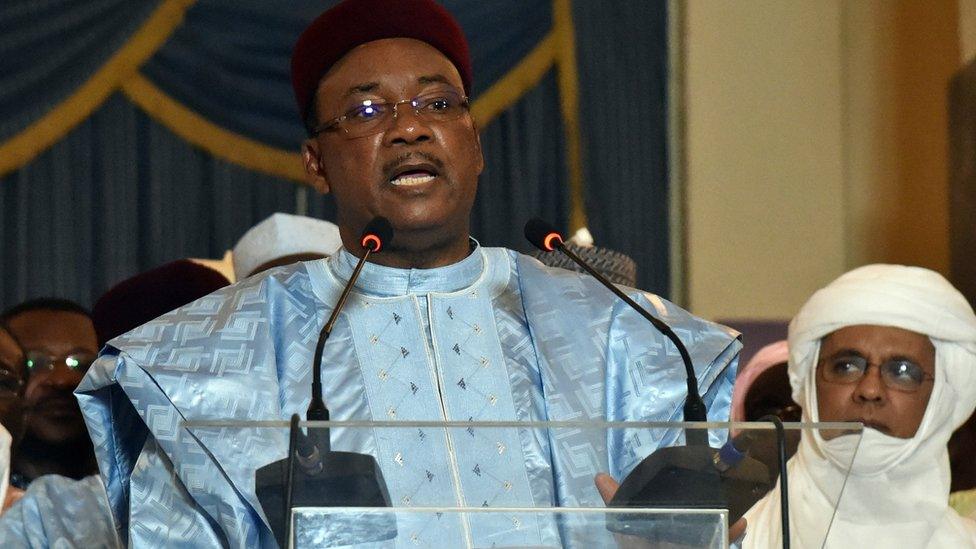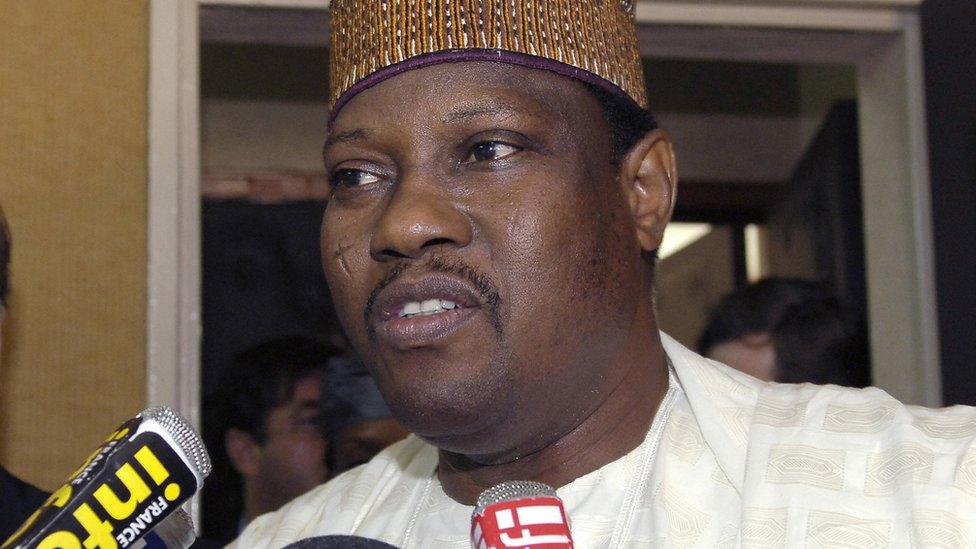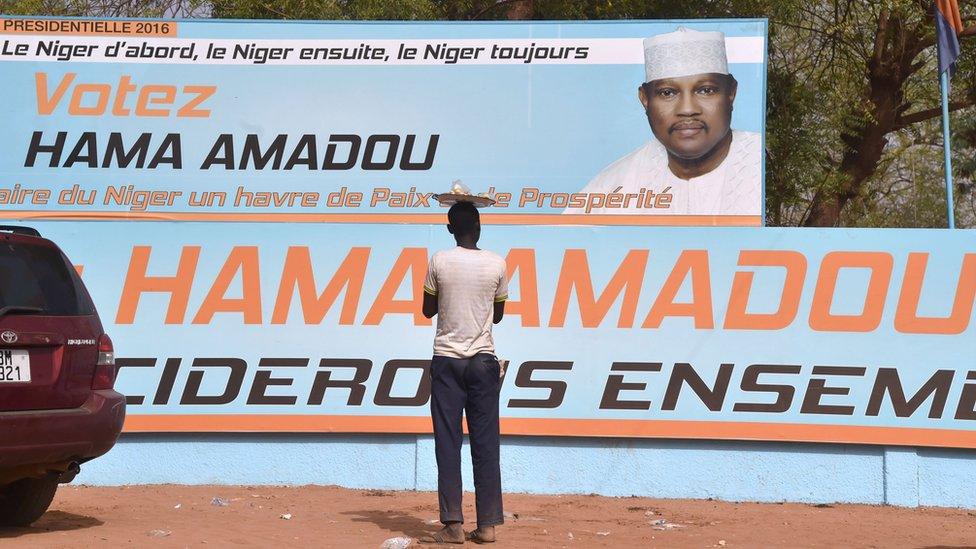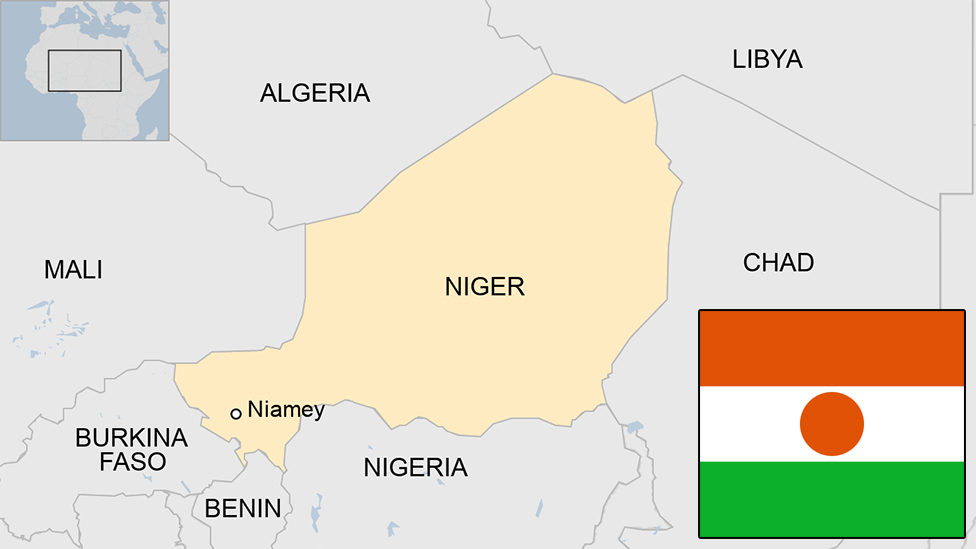Niger election result may hit region's Boko Haram fight
- Published

Niger's incumbent president Mahamadou Issoufou is likely to remain in power
The second round of the Niger presidential election takes place on Sunday 20 March, and the result may have implications for regional stability and the fight against Islamist terrorism in West Africa.
Incumbent President Mahamadou Issoufou looks set to secure a second term in office, as opposition candidate Hama Amadou has been evacuated from prison to France for specialized medical treatment just days before the run-off, raising concerns over the poll.
The former parliamentary speaker and prime minister has been in detention in the south-western town of Filingue since November 2015 over allegations of baby trafficking. He has dismissed the charges as politically motivated.
Niger is seen as a key ally in the fight against Boko Haram, and President Issoufou has been praised in the West for rallying neighbouring countries to fight the group.

What is the likely outcome?
President Issoufou seems poised for victory in the run-off, having narrowly missed outright victory in the first round with 48% of the vote.
Having garnered only 17%, it will be difficult for Mr Amadou to bridge the gap despite the opposition alliance backing him. Mixed messages about a poll boycott are also likely to weaken his chances.
It is still unclear if the Opposition Coalition for Change (COPA 2016) - an alliance formed to back Mr Amadou - will take part in the vote, having announced a boycott.
The opposition has said it will not recognise the outcome, saying Mr Amadou's imprisonment prevented him from campaigning, among other complaints; while the government's handling of his medical condition is a sensitive issue that could inflame tensions.

What is Hama Amadou's current condition?

Hama Amadou has been in detention since November 2015
The nature of Mr Amadou's illness is not clear, but the government says he has "a chronic illness which he has suffered from for three years". The 66-year-old received medical treatment for an eye condition recently.
On 14 March, he reportedly lost consciousness before being revived at the prison clinic, his doctor telling a local TV station that he had fainted.
The doctor was later arrested for "revealing medical confidentiality and spreading false news".
On 16 March, it was reported that Amadou had been flown to France for "specialist treatment", with the government claiming that he was suffering from "general fatigue".

Will the opposition take part in the run-off?

Hama Amadou campaign poster outside COPA's headquarters in Niamey
The opposition has made conflicting statements about their participation. On 8 March, COPA 2016 announced its withdrawal on account of "irregularities and massive fraud".
However, the coalition reportedly did not consult Mr Amadou about the boycott, and his camp later asserted that he would take part in the vote.
The Independent National Electoral Commission (CENI) says the opposition candidate's name will be on the ballot because he had not formally withdrawn his candidacy by the cut-off date of 10 March.
The governing Niger Party for Democracy and Socialism (PNDS) says the vote will proceed with or without the opposition, accusing its rivals of fearing "dismal defeat".

Niger at a glance

Population is of 16.6 million people; 7.5 million are eligible voters
UN report said last month about two million people would need urgent food aid this year due to drought
Challenges include unemployment and absence of infrastructure
Country has oil, gold and uranium deposits, as well as agricultural potential

What are the key issues facing the country?
Niger is fragile and its stability is at stake as one of the poorest countries in Africa.
It also finds itself on the frontline in the fight against jihadist group Boko Haram, and Mr Issoufou has been active in rallying a regional force against the group.
The president claimed to have foiled a coup against him in December, and military officers and opposition leaders were subsequently arrested.
Seen as a key ally of the West in ongoing counter-terrorism operations in the vast Sahel region, the incumbent president has been described as one of French President Francois Hollande's "most loyal African partners".
It has also been attacked by al-Qaeda in the Islamic Maghreb.

What is Niger like?
A vast, arid state on the edge of the Sahara desert, Niger is rated by the UN as one of the world's least-developed nations.
BBC Monitoring reports and analyses news from TV, radio, web and print media around the world. You can follow BBC Monitoring on Twitter, external and Facebook, external.
- Published4 August 2023
